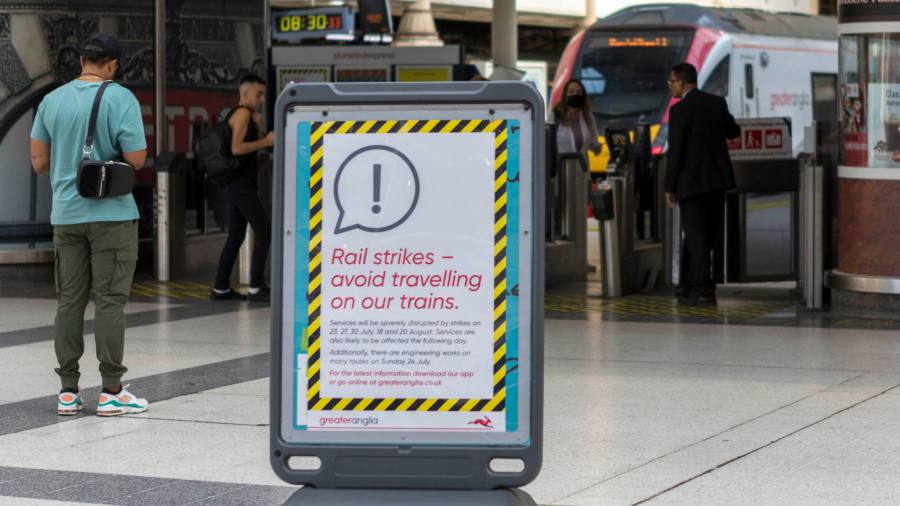
UK train drivers are preparing to take part in industrial action again in early October, following a summer of railway disruption, with the walkouts timed to disrupt the Conservative party conference.
Drivers’ union Aslef has told managers at 12 train operating companies that it will call on workers to strike on October 1 and 5, in a move expected to shut down large parts of the national rail network.
The union has ruled out making a public announcement until after Queen Elizabeth II’s funeral on Monday. But it has given operators the two weeks’ notice that are legally required to launch industrial action, according to two people familiar with the matter.
The strikes will cause widespread disruption before and after the Tory party conference, which is scheduled to take place in Birmingham between October 2 and 5.
Passengers who travel between London and Birmingham are already contending with major disruption, after operator Avanti West Coast was forced to introduce a reduced timetable because of driver shortages.
Aslef is in a dispute with the rail industry over pay and has called for significant wage rises to help its members cope with soaring inflation.
One rail industry executive said that although Aslef’s decision to notify companies during a period of national mourning was “regrettable”, the railway would try to minimise the strikes’ impact.
Passengers have endured repeated walkouts in recent months because of mounting unrest between unions, train operating companies and the government.
The government, which controls the industry’s finances, and rail companies argue that significant pay rises can only be afforded if unions accept sweeping modernisation, such as changes to working patterns.
The RMT and TSSA unions — which are in their own disputes with the government and train operators over pay, conditions and possible job losses — are also expected to restart their campaign of strikes soon.
Railway executives are preparing for the RMT to announce a strike on October 1. The union declined to comment.
Hostilities in industrial relations were put on hold following the Queen’s death, with unions cancelling strikes planned for September as a mark of respect. But the truce is likely to be shortlived.
Unite, which represents workers at Felixstowe, has already set fresh dates for a week of strike action at the UK’s biggest port, starting at the end of the month.
Unions representing rail and postal workers are set to follow suit.
Meanwhile, civil servants and NHS staff are among public-sector workers who will be balloted on potential nationwide strike action over the autumn.
Unite on Friday also criticised the Construction Industry Joint Council, an employers’ group, for refusing to guarantee workers an additional bank holiday to mark the Queen’s funeral.
The CIJC said that given the short notice of the holiday, it should be for employers to decide whether to award time off.
Unite said this was at odds both with previous practice and with the approach taken elsewhere in the construction industry.
Unions are separately preparing for confrontation with the government of new prime minister Liz Truss, in light of her pledges to introduce legislation making it harder for workers to walk out and to review EU-derived laws that govern workers’ rights.
The Trades Union Congress, which speaks for the UK’s labour movement, on Saturday called for the government to strengthen workers’ rights.
It said that six months on from P&O’s mass sacking of its UK sailors, the ferry operator had been “allowed to get away scot-free” despite the government vowing at the time to hold the company to account.
Aslef, the Department for Transport and the Rail Delivery Group, an industry body, all declined to comment.

